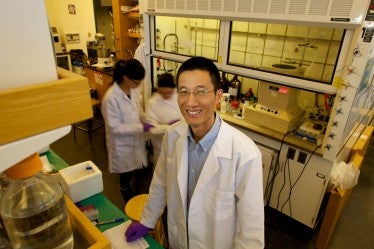RIVERSIDE, Calif. — Anticancer drugs save lives and/or improve the quality of life for many cancer patients. Many anti-cancer drugs work by killing tumor cells after inducing damage to DNA.
The public has an opportunity to learn about the mechanisms of action of some commonly used anticancer drugs and how laboratory research may lead to novel targets and new strategies for cancer treatment.
Yinsheng Wang, a professor of chemistry at the University of California, Riverside, will give a free lecture on May 16 on campus to discuss those drugs that induce damage to DNA, as well as those biomolecules that allow for selective targeting of tumor cells. He will also discuss the implications of personalized medicine in cancer treatment.
Wang’s hour-long talk is titled “Curing cancer: How do anticancer drugs work?” It will begin at 5:30 p.m. in Rooms C, D and E, University Extension Center (UNEX). Seating is open. Parking at UNEX is free for lecture attendees.
The lecture is the third in the annual Science Lecture Series hosted by the College of Natural and Agricultural Sciences (CNAS). This year the theme is “The Science of Disease.” The series aims to boost the public’s awareness and understanding of science and of how scientists work.
“Anti-cancer drugs induce their cytotoxic effects via different molecular targets,” Wang said. “Patients’ genetic make-up can have a significant effect on the clinical efficacies of anti-tumor drugs. Innovative technologies may lead to the discovery of new molecular targets that can be used for more effective treatment of cancer while minimizing side effects.”
Wang is the director of the Environmental Toxicology Graduate Program at UC Riverside. He received his bachelor’s degree from Shandong University and master’s degree from the Chinese Academy of Sciences. He joined the UCR faculty in 2001, after earning his doctoral degree from Washington University in St. Louis.
He is the recipient of the 2013 Biemann Medal and a 2005 Research Award from the American Society for Mass Spectrometry, as well as the inaugural Chemical Research in Toxicology Young Investigator Award from the American Chemical Society in 2012. He was named a Fellow of the American Association for the Advancement of Science in 2012.
Research in the Wang group is concentrated in two broad areas. The first is DNA damage and repair. His lab uses a variety of chemical and biological tools to understand, at the molecular level, how various kinds of damage to DNA are repaired, and how they affect the flow of genetic information during DNA replication and transcription. His work has brought scientists’ understanding of the biological consequences of DNA damage to a new level.
His lab’s second research area is proteomics, the study of the functions, structures, and interactions of proteins. His work in this area has led to the discovery of novel mechanisms of action of some anti-tumor drugs and environmental toxicants. In particular, he seeks to understand alterations in the expression of proteins in cells that are treated with anticancer drugs and other agents.
Wang’s lecture will be introduced by Aurora Johnson, a physical science teacher in the Moreno Valley Unified School District with 11 years of teaching experience. Previously, she worked in the Riverside and Palm Springs Unified School Districts. She was educated at Riverside City College, Grand Canyon University, and UCR.
More information about the lecture series can be obtained by visiting www.cnas.ucr.edu, calling (951) 827-6555 or emailing Carol Lerner.
Teachers interested in receiving professional development credit for attending the lecture series must make arrangements in advance with University Extension [awebb@ucx.ucr.edu; (951) 827-1653].
